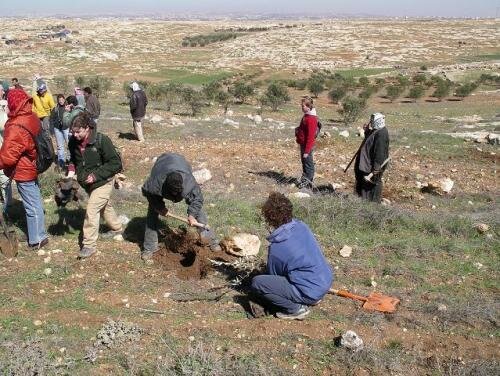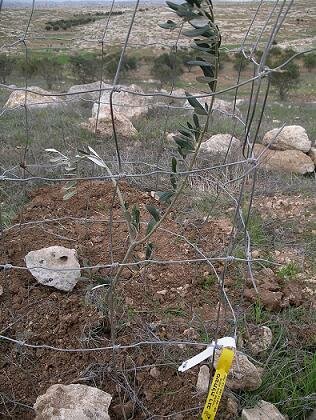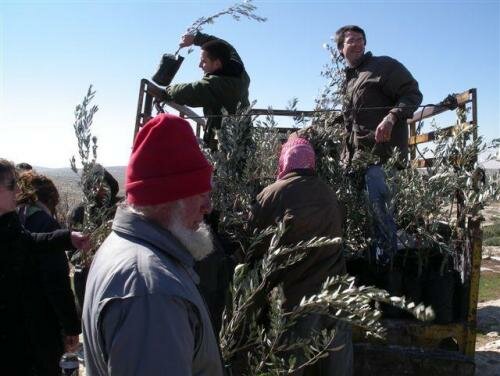You are here
The Unholy Alliance Strikes Back
It was a beautiful winter day. I was among approximately 80 Israeli activists who set out to plant trees in the South Hebron region, home to hundreds of Palestinian cave-dwellers. The desert air was chilly, the land moist after the rains, and the hills full with wild flowers. Yet the tranquil setting was deceptive.
For years the cave-dwellers have been subjected to ongoing harassment by the Israeli military, police, and Jewish settlers, whose aim is to undercut their livelihood so that they will "voluntarily" move to other parts of the West Bank. The idea, so it seems, is to cleanse this region of its Palestinian inhabitants. 
The cave-dwellers are farmers who do not have running water or electricity and are dependent on subsistence agriculture. Aware of their unique lifestyle, the settlers strike them where it hurts most. In the past they have destroyed and poisoned their water wells, obstructed their access to grazing grounds, prevented them from plowing land and from harvesting their crops, and more recently have uprooted and cut down their olive trees. While there were days when the military and police initiated such violations, lately they have stepped back and allowed the settlers to take the lead. The settlers, in other words, have become the government's instrument of destruction.
That Saturday we decided to plant 1,000 trees, as a way of marking the Jewish holiday Tu Bishvat and the Muslim holiday Id el Shajar (both of which celebrate the life of trees), while strengthening the Palestinian inhabitants' efforts to hold on to their land. Scores of Palestinians from all over the Hebron region came to join this non-violent action and to express their solidarity with the cave dwellers.
A few hundred yards before we reached our destination we were met by the police and military. Amazingly, a whole company of men in uniform were mobilized because a group of Israelis and Palestinians wanted to plant a few trees together.
After inspecting our identity cards and processing the information in their computer database we were allowed to continue. "We are doing you a favor," one officer said, "since actually the whole area has been declared a closed military zone."

Working together, Palestinians and Jews, we planted the 1,000 trees within just a few hours. As we were getting ready to return home, however, about two dozen settlers appeared on the scene.
Considering that these settlers are religious, they had, no doubt, just been to synagogue. Incidentally, the service that Saturday morning was about Moses and his relationship with Jethro, a non-Jew. The torah portion tells the story of Moses, who had fled Egypt for the first time and traveled to Midian where he married Tziporah, the daughter of Jethro, and had two children. Later Moses returns to Egypt alone and leads the Israelites in their exodus. Jethro hears of the event and sends word to Moses, "'I, your father in law, Jethro, am coming to you with your wife and her two sons'. Moses went out to meet his father in law: he bowed low and kissed him..."
In the bible Moses pointedly states, "Jethro received me, opened his house for me, and I was like a son to him." Jethro is subsequently called "one of the righteous of the nations."
The Jewish settlers had read about the relationship between the non-Jew Jethro and the greatest of the Hebrew prophets, Moses, and learned nothing. The image of Palestinians and Israelis planting olive trees together, and enacting, in a sense, the relationship of mutual respect described in the bible, outraged them. To keep the peace, the military and police had to create a human barrier to prevent the settlers from reaching us.
The following morning, the Palestinians woke up to a new reality. Instead of uprooting the trees as they had done in the past, the settlers had stolen them, surrounding each tree with a fence and a small mark stating that the trees belonged to the settlement's nursery. The idea was not only to rob the new trees from their rightful owners, but also to expropriate the land on which they were planted.
The plots' owners called us so that we could take pictures of the stolen property and use it as evidence in court. As it turned out, though, the settlers were also using the trees as a ploy to trap the Palestinians.

When the Palestinians and Ta'ayush (Arab-Jewish partnership) activists approached the trees, the settlers called the military and police, complaining that the cave-dwellers were trespassing on settlement land. Instead of arresting the real thieves, the security forces set up checkpoints throughout the region in order to find the Palestinian "culprits" who had dared to return to their plots, the same plots on which the police had allowed them to plant new trees the day before. Once again the unholy alliance between the settlers, military and police revealed itself..

